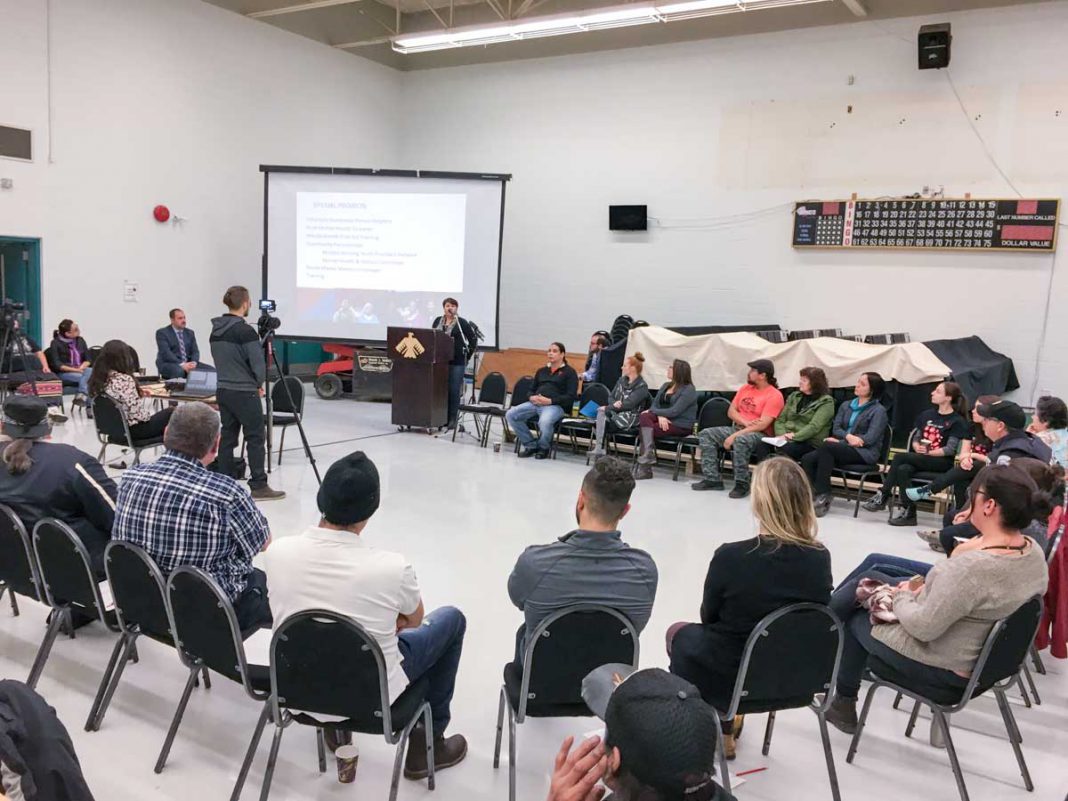M’CHIGEENG—In honour of National Addictions Awareness Week, Noojmowin Teg Health Centre hosted its second annual conference on Thursday, November 16 allowing service providers across the Districts of Manitoulin and Sudbury to share their services with the public and giving those who have overcome addiction a platform to offer their story of hope and overcoming adversity.
The morning session gave service providers an opportunity to talk about their offerings. First up were representatives of Rainbow Lodge in Wiikwemkoong who noted that much of their work deals with being proactive, such as talking to children in elementary school about the dangers of drugs and alcohol, “character building based on the Seven Grandfather teachings,” they explained.
Rainbow Lodge offers a prevention program that readies people for treatment, mind and body, and the 28-day rehabilitative program for those coming off drugs or alcohol that is also based around the Seven Grandfather teachings rather than the more traditional 12 step program. “The feedback is phenomenal,” they said.
“We do a lot of one-on-one with community members,” said Matthew of Rainbow Lodge. “Individual counselling, support etc.”
Thursday nights there is a healing circle at the Wiikwemkoong Health Centre that also acts as a sharing circle. The duo explained that Rainbow Lodge offers programs specific to cocaine, crack cocaine, opiates, alcohol, marijuana, tobacco and more.
“As service providers, we need to prepare for the upcoming marijuana legislation,” Matthew said, addressing the group.
Rainbow Lodge also offers a partner assault response program, pre-treatment, after-care and continuing care—“we stay with them right through the process.”
It was noted that many Grade 6 students already know people who are using marijuana.
“Character building helps (students) to develop good, solid characters,” they explained, noting that some children may not have these kinds of relationships at home.
Mark Forsythe of Health Sciences North (HSN) spoke of the offerings found through HSN at the Manitoulin Health Centre in Little Current, namely assessment, referral, case management and community-based treatment. They can be found on the third floor of the Little Current site of the MHC with a satellite office in Gore Bay, he said.
Individuals can self-refer, make an appointment for an intake session to assess what their level of need is and then become paired with a case management worker.
“There can be a wait time, but it’s usually not so bad, except for psychiatry,” Mr. Forsythe admitted.
Mr. Forsythe also spoke of the Manitoulin Drug Strategy, of which he is the chair.
He explained that the group formed four years ago in response to what was almost a shortage of addictions treatment physicians on Manitoulin when Dr. Brian Dressler decided to stop his practice on Manitoulin.
The Manitoulin Drug Strategy recently launched a survey to get a sense of the needs and wants of the community when it comes to addictions services, as well as education.
“We hope to gain information to help guide the strategy,” he said. “Policing is not going to fix the issue, but rather harm reduction and making sure people have access to service.”
He encouraged people to reach out to the Manitoulin Drug Strategy by emailing them at manitoulindrugstrat@gmail.com.
“Anyone is welcome to the meetings,” he noted.
Melanie Francis is a Fetal Alcohol Spectrum Disorder coordinator with Noojmowin Teg who spoke about referrals to her office for an FASD diagnosis and how life-changing that can be for a person living with FASD, and their family.
Once a person comes in requesting an FASD diagnosis, Ms. Francis sends them to Sudbury for three days of testing. After the child, or adult, receives the diagnosis Ms. Francis links them up with help from everything ranging from nurse practitioner appointments to psychiatry.
“Children with FASD often struggle in school and are often operating at half the level of their classmates,” she explained. “People think that people with FASD look different, but 80 percent of them don’t look any different from you or me.”
Daughness Migwans, social navigator for the United Chiefs and Councils of Manitoulin Anishnaabe Police, spoke about her role with the police and their ground breaking work through Gchi Mino Naadmaadwin Teg—‘where someone can get the ultimate level of service.’
She explained that she works by helping people who are coming into contact with the law, especially when addictions or mental health issues are at play.
“I work with the officers to help people that need other supports,” Ms. Migwans said, “and track trends as a result of the things we’re seeing in the community and so we can focus our attentions there through education.”
Every week the Gchi Mino Naadmaadwin Teg group meets on a rotating basis, allowing each of the UCCMM communities to host every six weeks where the situations in the communities that are potentially high risk are discussed.
Ms. Migwans’ role as social navigator also means she’s responsible for the voluntary vulnerable person strategy; brief mental health screener (recording information known about a person’s mental illness so that all know how to approach their situation); mental health first aid training (all of the UCCM Police officers have received this training) and much more.
It was noted that this program is unique to UCCM and not being done anywhere else.
Northwood Clinic also presented at the conference. Northwood, based out of Sudbury, specializes in opiate addictions in mental health and provides walk-in and outpatient services.
The Northwood Clinic duo noted that they offer “carefully-tailored person-centred treatment” as well as methadone and suboxone treatment programs.
“Our immediate goal is to stabilize our patients,” the representatives said. Northwood also offers traditional counselling as well as treatment for depression and anxiety, which often go hand in hand with addiction, they noted, as an addict’s identity is often “battered and shaded.”
“We’re way past due to be having this conversation. To tackle the epidemic head on, we need to come together as a community,” they said.
Kathy Martin, an addiction support worker at Noojmowin Teg, spoke of the Women for Sobriety evenings hosted in Aundeck Omni Kaning (AOK). The group is for women who relapse because they don’t feel good about themselves and is based on 13 statements that reinforce positive feelings.
The group meets on Thursday evenings at 6 pm at the Four Directions Complex in AOK. “We ask that women not use on the day of the meeting to be as clear headed as possible,” Ms. Martin said.
“I’m so grateful to be speaking about addictions today in the way that we should have a long time ago,” she added.
Rob Wabegijig next spoke about the community withdrawal management service which now operates out of Noojmowin Teg and is open to all members of the Manitoulin Island community.
“We have been with Nooj since April,” Mr. Wabegijig explained. “We do intake and assessment, manage withdrawal and continuing care. We cover all of Manitoulin and Whitefish River First Nation and are open to all over the age of 16. Anybody can refer.”
Mr. Wabegijig said they will contact the client as soon as possible after the contact is made and offer home visits.
“We also work with people in harm reduction programs as well as continuing care—offering support in challenging times,” he added.
Constable Murray Still, community services officer (CSO) with the UCCM Anishnaabe Police, told the group that he has worked for 22 years as an officer, the last three of those as a CSO.
He spoke of the many inter-agency partnerships he has through UCCM Police as well as the proactive policing programs undertaken by the force.
“I help with traffic enforcement (RIDE checks), the drug unit and work closely with Daughness (Migwans, social navigator),” Constable Still said. “I do a lot of outreach with her, and I work closely with other police forces.”
He spoke of the talks he gives such as bullying, cyberbullying, drug prevention, violence prevention, elders and prescription medication and securing your home, to name just a few.
“I’m slowly trying to close the gap in our community,” he said in reference to the distance between the police and the people they serve.
Other speakers throughout the morning included Sam Gilchrist on behalf of Gwekwaadziwin—the soon-to-be youth treatment centre; Sarah Seabrook, Noojmowin Teg child and youth mental health and addictions worker; and Floyd Ense and Joan of the M’Chigeeng Health Centre.





